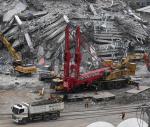You are here
Another nail in the coffin of the ‘peace deal’
Dec 29,2021 - Last updated at Dec 29,2021
The decision of the Israeli government to invest more than $300 million with the aim of doubling the Jewish colony population in the Golan Heights puts another nail in the coffin of Arab-Israeli peace. Syria, which condemned the initiative as a "flagrant violation" of its sovereignty, and a majority of Arabs will never agree to normalise relations with Israel as long as it continues colonising Arab land.
The plan is to build 7,300 homes for 23,000 colonists in the region within five years. A present there are 25,000 colonists, 23,000 Syrian Druze and 2,000 Alawites in the Golan. Israel conquered the strategic territory in 1967 and annexed it in 1981. Donald Trump dismissed the international community's rejection of the Israeli unilateral annexation and recognised Israeli sovereignty over the region in 2019.
Unfortunately, the Biden administration has not reversed that policy, encouraging Israeli Prime Minister Naftali Bennett to go ahead with his plan. He argues that Syria, struggling to recover from a decade of civil and proxy warfare, is in no position to absorb the Golan although most of its Druze residents remain Syrian citizens. Having has made his reputation as a strong supporter of the colonisation enterprise in East Jerusalem and the West Bank, Bennett clearly wants to be seen as the politician who clinched Israeli control over the Golan as well after years of neglect while priority was given to the occupied Palestinian lands which Israel is determined to annex.
In October 1973, the Syrian army partially liberated the Golan Heights but was overwhelmed by Israeli forces after fighting ceased in the Sinai. After the disengagement agreements were signed Syria did regain a slice of territory where Quneitra, the capital of the Golan province, is located. Many years ago I visited Quneitra which has not been rebuilt but kept as a monument to Israeli brutality. Homes, public buildings, and houses of worship were empty shells. Gaping holeswere made in interior walls to enable Israeli troops to move from home to home while training for urban warfare.
Following the 1991 Madrid peace conference, there were efforts to negotiate a deal over the Golan between Syria and Israel but these failed when Israel refused to return all the land belonging to the Golan.
More than 130,000 Syrians were expelled from the Golan when Israel seized the territory 54 years ago. While some fled the war, the majority remained but were systematically expelled by the Israeli forces. It followed the pattern set when conquering Palestinian territory in the 1948 war by bulldozing villages. Only 6,000 Syrians remained.
Today Syrian refugees from the Golan, who cling to their identity as "Golanis", number at least half a million and form a formidable lobby in Syria. There is even a Golan refugee club near my hotel in central Damascus.
It is significant that the entire cabinet approved Bennett's move despite the presence of leftish ministers from the Meretz Party who had plenty of time to consider options as he announced his intention in October and said the ultimate goal was to plant another 75,000 Israelis in the Golan. Meretz ministers Tamar Zandberg and Nitzan Horowitz attended the meeting although Zandberg stated, weakly, that the decision was “complicated. We support peace and hope one day it will happen”. Regional Cooperation Minister Esawi Frej, also of Meretz, did not participate. Although he took a stand, Meretz, a socialist party which backs the "two state solution", is clearly a broken reed.
With six seats in the Knesset, Meretz could have brought down Bennett's narrow coalition which has 60 seats in the 120-member parliament. Instead, Meretz collaborated in order to sustain a government formed by disparate parties on the basis of "anything but Bibi", former prime minister Benjamin Netanyahu. Meretz, however, faces an ambitious Bennett who flatly rejects the emergence of a Palestinian state and intends to do everything in his power to ensure that colonisation makes this impossible.
Bennet arranged this move carefully. He held the Cabinet meeting in the Golan itself and timed it to take place Christmas weekend when the Western world was fully occupied with celebrations despite rampaging COVID. Consequently, there has not been a squeak of protest from the usual international opponents of illegal Israeli land grabs.
Knesset member Ahmad Tibi of the opposition Arab Joint List Party declared, "It doesn't matter how many Cabinet meetings are held on the Golan. It is occupied Syrian territory. All parts of the coalition are responsible for the decisions made during this cabinet meeting, as well for the deepening of the settlements and the violence of the settlers."
Indeed, the lack of response by Meretz and other leftish Israeli groupings and of the international community could very well lead to domestic and foreign disengagement from Israel's colonisation drive and to the refusal to counter the "normalisation" of rising violence perpetrated byIsraeli colonists against Palestinians. By failing to put the brakes on Israel, both Israeli and foreign opponents of its expansionist policies are enabling Israel to carry on, creating a dangerously explosive situation, particularly in the West Bank and East Jerusalem. After 73 years of outrageous behaviour, no one even attempts to curb Israel.














